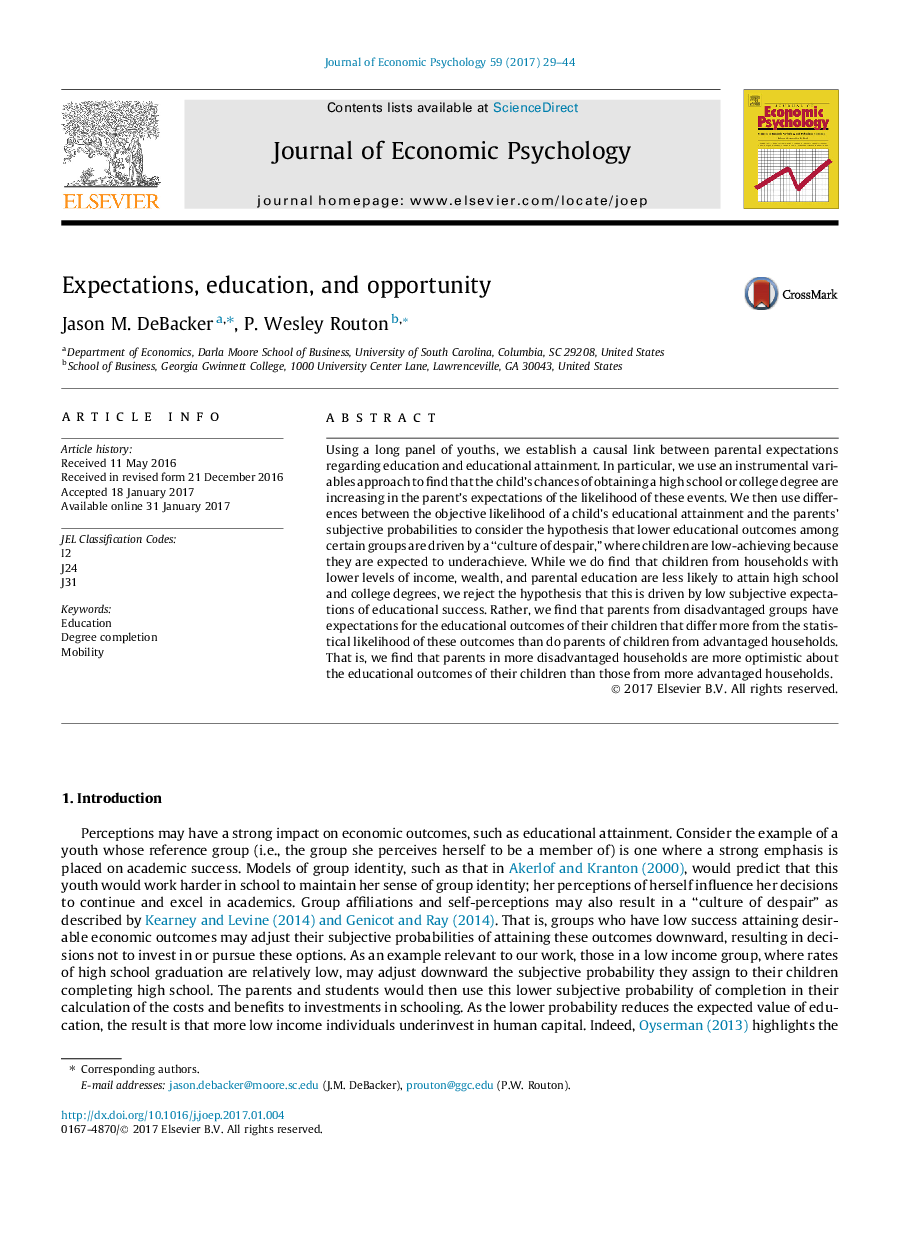| کد مقاله | کد نشریه | سال انتشار | مقاله انگلیسی | نسخه تمام متن |
|---|---|---|---|---|
| 5034787 | 1471707 | 2017 | 16 صفحه PDF | دانلود رایگان |
عنوان انگلیسی مقاله ISI
Expectations, education, and opportunity
ترجمه فارسی عنوان
انتظارات، آموزش، و فرصت
دانلود مقاله + سفارش ترجمه
دانلود مقاله ISI انگلیسی
رایگان برای ایرانیان
کلمات کلیدی
ترجمه چکیده
با استفاده از پانل طولانی جوانان، ارتباطی علیه بین انتظارات والدین در زمینه آموزش و تحصیلات ایجاد می کنیم. به طور خاص، ما از رویکرد متغیرهای ابزاربندی استفاده می کنیم تا ببینیم که شانس امتحان دبیرستان یا کالج در انتظارات والدین از احتمال این حوادث افزایش می یابد. سپس از تفاوت های بین احتمال هدف از دست یابی به تحصیلات کودک و احتمال های ذهنی والدین استفاده می کنیم تا فرضیه را مطرح کنیم که پیامدهای آموزشی پایین تر در میان گروه های خاص، توسط یک فرهنگ ناامیدی به وجود می آید؟ جایی که کودکان دست کم دست به دست می گیرند، زیرا انتظار می رود که آنها دست کم بگیرند. در حالیکه ما متوجه می شویم که کودکان خانواده های دارای درآمد، ثروت و تحصیلات والدین پایین تر از حد پایین به تحصیلات دبیرستان و کالج می رسند، فرض ما این است که این انتظارات ذهنی پایین موفقیت تحصیلی را رد می کند. در عوض، ما دریافتیم که والدین از گروه های محروم از انتظارات آموزشی فرزندانشان انتظار دارند که از احتمال آماری این نتایج بیشتر از والدین فرزندان خانواده های محروم متفاوت باشند. به این ترتیب، ما می بینیم که والدین خانواده های محروم تر، نسبت به نتایج آموزشی فرزندانشان نسبت به خانواده های دارای مزیت بیشتر خوش بین هستند.
موضوعات مرتبط
علوم انسانی و اجتماعی
مدیریت، کسب و کار و حسابداری
بازاریابی و مدیریت بازار
چکیده انگلیسی
Using a long panel of youths, we establish a causal link between parental expectations regarding education and educational attainment. In particular, we use an instrumental variables approach to find that the child's chances of obtaining a high school or college degree are increasing in the parent's expectations of the likelihood of these events. We then use differences between the objective likelihood of a child's educational attainment and the parents' subjective probabilities to consider the hypothesis that lower educational outcomes among certain groups are driven by a “culture of despair,” where children are low-achieving because they are expected to underachieve. While we do find that children from households with lower levels of income, wealth, and parental education are less likely to attain high school and college degrees, we reject the hypothesis that this is driven by low subjective expectations of educational success. Rather, we find that parents from disadvantaged groups have expectations for the educational outcomes of their children that differ more from the statistical likelihood of these outcomes than do parents of children from advantaged households. That is, we find that parents in more disadvantaged households are more optimistic about the educational outcomes of their children than those from more advantaged households.
ناشر
Database: Elsevier - ScienceDirect (ساینس دایرکت)
Journal: Journal of Economic Psychology - Volume 59, April 2017, Pages 29-44
Journal: Journal of Economic Psychology - Volume 59, April 2017, Pages 29-44
نویسندگان
Jason M. DeBacker, P. Wesley Routon,
